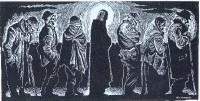Why This Issue?
The banks of the Mississippi river at St. Louis are lined with pockled, knobby-looking cobblestones, which border the slow moving waters for about a half mile up and down river. Their horizontal rows slip into the river at its edge and line the rise of the bank up to Wharf Street, which runs parallel to them. Rusty iron rings fastened into the cobblestones testify to the docking of old steamboats and barges. Twisted and gnarled branches of driftwood lie about, having been nursed by the current onto land.
The rise of the bank leads the eyes upwards. A hill graded by a long, wide stairway leads to a broad expanse of green lawn, spotted by trees, which sits high above the river. The land majestically showcases the Jefferson National Expansion Memorial, the elegant silver sculpture better known as the Gateway Arch.
What is perhaps not so widely known is that the acres of Arch grounds cover over the entire 40 blocks that was once the original village of St. Louis. And that a large Mound constructed by the Cahokia mound builders also once rose above the banks at this point.
Just as this piece of land is forgotten, so is the original history of our town often overlooked. It is also covered over, bypassed for a more triumphal narrative. The Arch celebrates the movement of European settlers into the westward lands of the continent. The history of our city (and of the U.S. generally) is often relayed through the march of armies, the acquisition of wealth, ‘discoveries’ by aristocratic explorers and the ongoing administrations of government officials.
Yet our city’s earliest history was marked more by cooperation than conquest. St. Louis’ founders were a 14 year old Creole from New Orleans and his mother’s long time aristocratic French lover. They traveled up river in order to establish an outpost for a fur business. They displaced no native peoples in the establishment of their outpost in February of 1764; in fact they had negotiated with the native tribes in order to obtain a lease on the land. The indigenous inhabitants of the region, especially the Osage, accepted the fur trappers as business partners in the Osage’s own thriving fur trade.
The first residents of the new city were mostly drawn from the French settlements in Illinois, refugees fleeing the British who had recently conquered their land. They included blacksmiths, carpenters, farmers, and above all merchants in this fur trading enterprise, as well as a sizable number of free blacks and Indians, and sadly, enslaved Indians and Africans. However, unlike New Orleans, which had been built by slave labor, St. Louis was built by the Illinois French who would inhabit it.
A truly Creole culture characterized the early years of the town, as French and Indians intermarried, and lived according to both French and Indian traditions. Neither of these cultures were puritanical; they knew how to party! They celebrated all the holy days, including Mardi Gras, Christmas, New Year’s Eve. It is noteworthy that there were never any fortifications built around the town for protection; they weren’t needed.
I think it is safe to say that here at the Worker, we love our city. We’re proud of our traditions, our free public museums and zoo, our architecturally rich neighborhoods with their assortment of ethnic restaurants and shops. Above all, we treasure the people who come to our doors. All of them have a story which is both unique to them, and which also ties them to larger groups and historical movements. And so we wanted to take a new look at our city’s history, its great moments and its failures, through the lens of the ordinary people who were its citizens. Our writers each drew on their particular expertise to bring us a personalist history, a new look at our old town.
Bill Ramsey writes of the history of the people’s struggles for rights. Teka Childress conveys the story of housing in St. Louis. Justin Stein shows how that story is being written again today, in developer Paul McKee’s efforts to blight the 5th Ward for his redevelopment plan. Mary Ann McGivern gives us the inside scoop on some of the economic decisions made by the powerful, and how they affected our neighborhoods. Tom and Maureen Filter-Nolan share their insights and experience on the education system in St. Louis.
In keeping with the theme of recovering our roots, Jenny Truax, in Catholic Worker Thought and Action, provides us with the little known history of the earliest Catholic Worker in St. Louis. Ashleigh Packard and Stewart Minor give us their newbie perspective on Karen House and Mike Baldwin sings us a song about Little House.
Revisiting our history is not just an academic exercise. We reclaim our past in order to reshape our future.
-Ellen Rehg |


